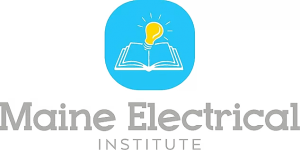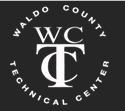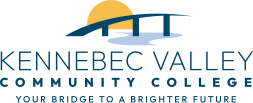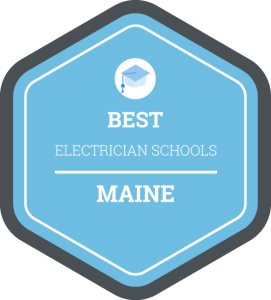This page includes information about the best electrician schools in Maine.
If you’re contemplating a career in this field, here you will find out more about your training options.
We have included information about the classes offered at the school, tuition costs, program duration, accreditation, and other useful facts that may help you decide if this career is right for you and choose the school that will teach you the skills needed for this profession.
The list includes different types of programs, from one-year certificate programs to five-year apprenticeships.
We invite you to read further to find out more.
1Maine Electrical Institute

About the School
Maine Electrical Institute provides students with electrician training in the classroom and online.
Students can choose between on-site, virtual, and correspondence training.
The school’s campus is located in Portland.
The curriculum covers the best practices and most effective techniques and keeps students up to date with the applicable code regulations.
The in-person journeyman program can be completed in two years and covers topics on:
- Basic Electricity
- Controls
- Blueprint Reading
- Conduit Bending
- Math
- Transformers
- Electronics
- And other tropics
The classroom program costs $6,000 for students who pay both years upfront.
The self-paced program has two options:
One-year program- a program that provides students with 225 hours of education needed to sit for a Limited to Residential house wiring license.
Two-year program- this program provides students with 576 hours of education needed to sit for the State of Maine Electrical Journeyman Exam
Each of the one-year self-paced correspondence programs is $2,250.
The two-year program costs $4,200 for those who pay both years upfront.
Individual courses are also available for students who want to finish their training and start a career as licensed electricians.
Contact Information
- Address: 320 Presumpscot Street, Unit 1, Portland, ME 04103
- Phone: 207-807-8994
- Website: https://www.maineelectricalinstitute.com
2MEMA Technical Education Center
About the School
MEMA Technical Education Center is owned and operated by more than 300 Maine and New England member companies.
The member companies help design the programs, donate equipment, and hire graduates.
The majority of graduates find employment in their field of training.
Students don’t have to take general education classes, the programs focus only on the topics relevant to the certifications students wish to obtain.
The school has a state-of-the-art 2,400-square-foot training facility.
Students spend almost half of their training time working with the equipment they see in the field.
The program is designed to be completed in just a few months.
Courses Offered
The center’s catalog includes courses on topics such as:
- Appliance Installation and Service
- AC Refrigeration and Troubleshooting
- HVAC/R Professional Certification
- Delivery Technician
- And more
Specialty training courses are also available at the center.
Contact Information
- Address: 25 Greenwood Road, Brunswick, ME 04011
- Phone: (855) 800-6832
- Website: https://mtecenter.com
3Eastern Maine Community College

About the School
Eastern Maine Community College offers post-secondary, career, and transfer education in a variety of fields.
The college’s 72-acre campus is located in Bangor.
The school’s catalog covers training programs in a wide range of industries, from automotive technology to nursing and liberal studies.
Students can choose between 30 one and two-year program options.
Short-term courses are also available.
Courses Offered
An Electricians Technology and an Electrical and Automation Technology program are available at Eastern Maine Community College.
The Electricians Technology part-time program provides students with the electrical and electronics foundational knowledge and skills needed for a career in the electrical trade.
This program covers the 576 hours of education needed for the licensure requirements applicable in the state of Maine.
The Electrical and Automation Technology pathway covers electronics, electricity, communications, and motion controls.
Students learn through a combination of theory and laboratory applications.
Among many other topics, the curriculum includes classes in DC/AC theory, digital and analog electronics, electrical machines and transformers, and basic wiring techniques.
Contact Information
- Address: 354 Hogan Road, Bangor, ME 04401
- Phone: 207-974-4600
- Website: https://www.emcc.edu
4Waldo County Technical Center

About the School
Waldo County Technical Center prepares high school students for careers or college education by providing a variety of learning experiences.
During training, students have the opportunity to earn certifications and college credits in different fields.
The center enrolls students from Belfast High School, Mt. View High School, Searsport District High School, the Ecology Learning Center, and home-schooled students.
Courses Offered
The center provides an Electrical Technology program.
This two-year nationally-accredited curriculum is designed for high school juniors and seniors.
The program combines classroom instruction with hands-on exercises.
Students enrolled in this program can earn a Maine Electrician Helper license which allows them to find employment working under the supervision of a Master Electrician.
The school also provides students with the opportunity to earn the 10-hour OSHA card and become certified in CPR and basic first aid.
Community college credits may be available to students who successfully complete this program.
Contact Information
- Address: 1022 Waterville Rd. Waldo, ME 04915
- Phone: 207-342-5231
- Website: https://waldotech.org
5Westbrook Regional Vocational Center

About the School
Westbrook Regional Vocational Center offers career and technical education opportunities for high school students.
According to the center’s website, 85 percent of the available programs are aligned with state or national certifications or licenses.
Westbrook Regional Vocational Center is accredited by the New England Schools and Colleges.
Courses Offered
The Electricity pathway available at Westbrook Regional Vocational Center equips students with entry-level skills needed for employment in the electrical field.
Students enrolled in this program learn how to install wiring systems using blueprints while following the National Electrical Code.
Among many other subjects, the curriculum covers topics on wire splices, low voltage systems, nonmetallic and metallic cables, and wiring.
The program also emphasizes safety at all times.
Students spend a lot of time practicing switching circuits and are exposed to real-world situations.
Dual enrollment and college credits are also available for qualifying students.
Contact Information
- Address: 125 Stroudwater St. Westbrook, ME 04092
- Phone: (207) 854-0820
- Website: http://westbrook.mainecte.org
6South Maine Community College

About the School
South Maine Community College is a public two-year college.
The college offers degree programs, classes, and job training opportunities in a variety of fields.
Among many other topics, the college provides Applied Technology Degrees and Certificates in Construction, Electrician Technology, Heating, and a variety of other fields.
Tuition for in-state students is $96 per credit hour.
South Maine Community College is accredited by the New England Commission of Higher Education.
Courses Offered
The Electrician Technology Certificate program includes classes in basic electricity, transformers, controls, electric motors, electrical blueprint reading, National Electrical Code, and many other related topics.
The program includes 33 credit hours organized into two full-time semesters.
An Associate in Applied Science Degree is also available and prepares students for the electrician licensure exam.
Graduates are also awarded two of the four years of on-the-job experience required for the State of Maine Journeyman Electrician Exam.
Contact Information
- Address: 29 Sewall Street, Brunswick, Maine 04011 (Midcoast Campus)
- Phone: 207-844-2102
- 2 Fort Road, South Portland, Maine 04106 (South Portland Campus)
- Phone: 207-741-5500
- Website: https://www.smccme.edu
7Central Maine Community College
About the School
Central Maine Community College provides degree and certificate programs that prepare students for careers in a variety of in-demand industries.
Central Maine Community College is accredited by the New England Commission of Higher Education.
Annual tuition for full-time in-state students is $2,880.
According to the college’s website, more than 75 percent of students receive some form of financial aid.
Courses Offered
The Central Maine Community College catalog includes an Industrial Technology & Transportation pathway.
An Electromechanical Technology program is available.
This program prepares students for careers in the electrical and electronic fields.
The Associate in Applied Science program covers five major areas of study:
- Electricity and Industrial Controls
- Digital and Analog Electronics
- Process Control and Measurement
- Robotics and Automation
- Telecommunications
The program is approved by the State of Maine Electrician’s Examination Board.
Students have to apply for a Helpers license when they begin their training.
Contact Information
- Address: 1250 Turner Street, Auburn, Maine
- Phone: 207.755.5100
- Website: https://www.cmcc.edu
8Lewiston Regional Technical Center

About the School
Lewiston Regional Technical Center combines rigorous academic study with the opportunity to apply knowledge to real-world situations.
The center uses a learning-by-doing approach.
Students participate in classroom, lab, and shop learning opportunities as well as community-based projects.
The center also maintains strong ties with the business community, institutions of higher education, and community organizations to help students achieve their goals.
Courses Offered
The Electricity program available at the Center is designed to introduce students to this field and to help them develop skills that can be applied to installing wiring systems from blueprints following the National Electrical Code.
Students learn how to wire commercial and residential projects.
The program is structured into two levels of study.
Each level provides three high school elective credits.
Those who complete the two-year program are awarded the 576 classroom hours required before sitting for the Journeyman licensure exam.
Contact Information
- Address: 156 East Avenue, Lewiston, ME 04240
- Phone: (207)795-4144
- Website: http://lewiston.mainecte.org
9Northern Maine Community College

About the School
Northern Maine Community College provides academic programs in a variety of fields, from healthcare to construction, and skilled trades.
Courses Offered
The Electrical Construction & Maintenance program available at Northern Maine Community College covers the fundamental principles used when installing equipment.
The program also includes the mathematical concepts necessary when planning electrical systems.
Students learn the National Electric Code and theory throughout the program.
The instruction combines theory, practice, and hands-on laboratory exercises on residential and commercial wiring systems, lighting design, and lighting control system installation.
Students who graduate with an Associate’s degree can apply 4,000 hours towards the Journeyman electrical licensing requirements.
The curriculum covers topics such as:
- Basic Residential Wiring
- Technical Mathematics
- Introduction to Digital Systems
- Motors and Controls
- Physics
- Technical Communications
- National Electric Code for Industry
- And more
The Associate in Applied Science requires 62 credits while the Electrical Construction & Maintenance Certificate Program requires 30 credits.
Contact Information
- Address: 33 Edgemont Drive, Presque Isle, Maine 04769
- Phone: 207-768-2700
- Website: https://www.nmcc.edu
10Kennebec Valley Community College

About the School
Kennebec Valley Community College provides more than 30 programs of study in a variety of academic fields.
Tuition is $96 per credit for in-state students.
The College is accredited by the New England Commission of Higher Education.
Courses Offered
The following electricity-related programs are available at the College:
- Electrical Lineworker- a one-year certificate program that provides students with a technical background and manual skills that can help them start a career in the field of installation and maintenance of electrical power, telephone, and cable television systems
- Electrical Technology- this program equips students with the technical background and manual skills needed for careers in the installation and maintenance of residential, commercial, and industrial electrical systems.
- Energy Services and Technology- this Plumbing and Energy Services program offers a two-year Associate in Applied Science degree, as well as a Plumbing Certificate, and an Energy Services Certificate alternatives
The programs combine classroom training with hands-on projects that allow students to develop proficiency in their field.
Contact Information
- Address: 92 Western Avenue, Fairfield, ME 04937
- Phone: (207) 453-5000
- Website: https://www.kvcc.me.edu
Schools Summary Table
Regional Salary in Maine
| Region | Employed | Avg. Annual Salary | Avg. Hourly Pay | Top 10% Annual Salary | Bottom 10% Annual Salary |
|---|---|---|---|---|---|
| Bangor, ME | 270 | $70,120 | $33.71 | $95,310 | $48,920 |
| Lewiston-Auburn, ME | 330 | $76,340 | $36.70 | $100,380 | $52,450 |
| Portland-South Portland, ME | 1,730 | $71,300 | $34.28 | $93,600 | $54,340 |
* Employment conditions in your area may vary.
Final Thoughts
Maine is home to many community colleges, trade schools, and organizations that prepare students for careers as electricians.
Our list compiled information about curriculum, tuition costs, duration, and other factors that may be relevant when choosing where to complete your training.
The next step is to continue with your own research depending on your schedule, learning style, and career aspiration decide what program works best for you.










